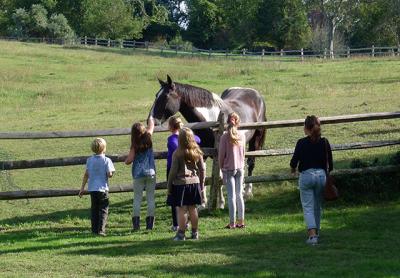Farmers, Chefs, Slow Food

As early adopters of the Slow Food movement, East End foodies may find the WLIW21 Metrofocus feature on the movement and its adherents old news. Yet to many around the region, the coverage of the East End’s farmers, chefs, and schoolyard gardens may prove edifying.
A screening of the feature and a panel discussion took place in Amagansett on Saturday. The segment included interviews with Scott Chaskey at Quail Hill Farm, Jason Weiner at Almond restaurant, Justin Wesnofske at his North Fork farmstand, and Megan Schmidt from the Good Farm Delivery, which offers an online service to order produce grown here.
The area looked its late-summer best, all golden light, green stalks, and vibrant flowers and vegetables, with charming schoolchildren pulling up carrots and other produce.
The panel consisted of Jack Bishop, a chef, author, and chief creative officer of “America’s Test Kitchen”; Judiann Carmack-Fayyaz, a teacher at the Bridgehampton School and Edible School Gardens co-founder, and Ian Calder-Piedmonte, a co-owner and farmer at Balsam Farms. Diane Masciale, the station manager of WLIW21, was the moderator.
There are now 25 East End school districts that have schoolyard vegetable gardens, Ms. Carmack-Fayyaz said, some of which even provide food to students as part of their lunch or to take home. “It’s a great model for the rest of the country.”
Mr. Bishop credited his family’s closeness to his commitment to cooking at home. “Our kids tell us everything, because they have to talk at dinner.” The use of fresh ingredients will always make someone a better chef regardless of skill, he said: “You will never be a good cook without good ingredients.”
Over the years, said Mr. Calder-Piedmonte, a transplant to the region, he had “grown and learned along the way.” He started out with a self-serve wagon and now has a farm and stand with 45 employees. Balsam Farms produce is also available through farmers markets, stores, and restaurants.
A major challenge for him is supply and demand. Who will take all the zucchini harvested in a given week? How long can it be stored and where? Some surplus goes to Long Island Cares, a nonprofit organization that acts as a distribution center for the area’s food banks.
Mr. Weiner said during the segment that he doesn’t decide his menu for the restaurant and then ask for a specific ingredient from farmers. Instead, he asks what’s available and builds a menu around it. Farmers appreciate that, Mr. Calder-Piedmonte said.
